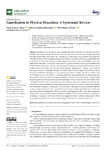Gamification in Physical Education: A Systematic Review

Use este enlace para citar
http://hdl.handle.net/2183/31825Coleccións
- Investigación (FEDU) [939]
Metadatos
Mostrar o rexistro completo do ítemTítulo
Gamification in Physical Education: A Systematic ReviewData
2022Cita bibliográfica
Arufe-Giráldez, V.; Sanmiguel-Rodríguez, A.; Ramos-Álvarez, O.; Navarro-Patón, R. Gamification in Physical Education: A Systematic Review. Educ. Sci. 2022, 12, 540. https://doi.org/10.3390/educsci12080540
Resumo
[Abstract] Background: In the last 10 years, gamification has entered the educational field incrementally. The subject of Physical Education has been one of the scenarios where multiple gamified learning environments were carried out. The objective of this work was to evaluate and analyze the scientific evidence of the pedagogical proposals and didactic experiences that have used gamification in the Physical Education classroom in Kindergarten, Elementary School and Middle, Junior and High School. Methods: A systematic review has been carried out following the recommendations set by the PRISMA Declaration. A total of five international databases were used: Web of Science (WoS), Scopus, Sport Discus, ERIC and Psycinfo. The descriptors “gamification”, “gamify” and “Physical Education” were used, limiting the search to December 2021. Several inclusion and exclusion criteria have been established, selecting only empirical research articles. Results: The search yielded a total of 177 eligible articles, and finally, 17 scientific articles that addressed the effects of gamification in Physical Education were selected. No gamified didactic experiences have been found in Early Childhood Education, but they have been found in Elementary School (7 experiences) and Middle, Junior and High School Education (10 experiences). Most of the studies have confirmed an improvement in motivation and commitment toward physical exercise in students; only one study has confirmed improvements in academic performance. The diversity of the applied protocols and the different evaluation instruments used by the researchers prevent a meta-analysis of the data. Some studies that have used a hybrid pedagogical model are recorded, combining gamification with other pedagogical models, and confirmed positive effects on different variables such as intrinsic motivation or autonomy in learning. Conclusion: The results of this review suggest the need to continue evaluating the effects of applying gamification, as an active methodology, in the Physical Education classroom.
Palabras chave
Gamification
Physical education
Pedagogical models
Active methodologies
Motivation
Physical education
Pedagogical models
Active methodologies
Motivation
Versión do editor
Dereitos
Atribución 3.0 España
ISSN
doi.org/10.3390/educsci12080540






